重阳节的英语介绍
- 格式:doc
- 大小:32.50 KB
- 文档页数:9
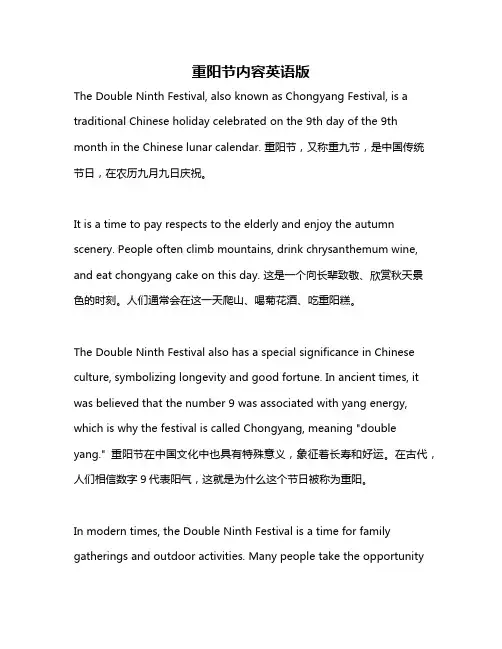
重阳节内容英语版The Double Ninth Festival, also known as Chongyang Festival, is a traditional Chinese holiday celebrated on the 9th day of the 9th month in the Chinese lunar calendar. 重阳节,又称重九节,是中国传统节日,在农历九月九日庆祝。
It is a time to pay respects to the elderly and enjoy the autumn scenery. People often climb mountains, drink chrysanthemum wine, and eat chongyang cake on this day. 这是一个向长辈致敬、欣赏秋天景色的时刻。
人们通常会在这一天爬山、喝菊花酒、吃重阳糕。
The Double Ninth Festival also has a special significance in Chinese culture, symbolizing longevity and good fortune. In ancient times, it was believed that the number 9 was associated with yang energy, which is why the festival is called Chongyang, meaning "double yang." 重阳节在中国文化中也具有特殊意义,象征着长寿和好运。
在古代,人们相信数字9代表阳气,这就是为什么这个节日被称为重阳。
In modern times, the Double Ninth Festival is a time for family gatherings and outdoor activities. Many people take the opportunityto spend time with their loved ones and appreciate the beauty of nature. 在现代社会,重阳节是家庭团聚和户外活动的时刻。
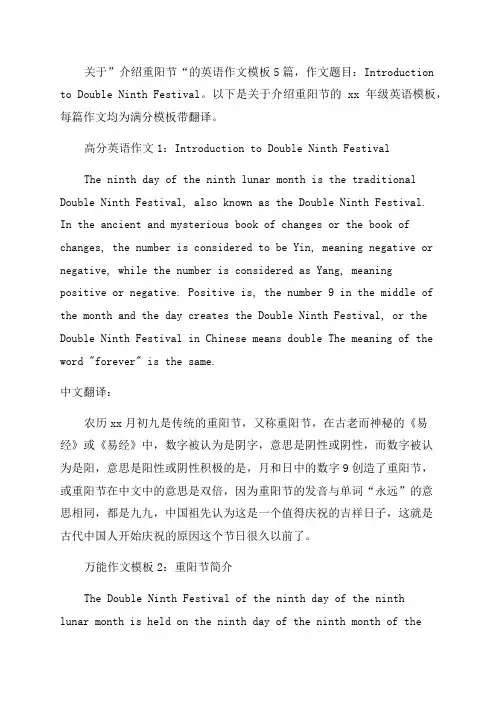
关于”介绍重阳节“的英语作文模板5篇,作文题目:Introduction to Double Ninth Festival。
以下是关于介绍重阳节的xx年级英语模板,每篇作文均为满分模板带翻译。
高分英语作文1:Introduction to Double Ninth FestivalThe ninth day of the ninth lunar month is the traditional Double Ninth Festival, also known as the Double Ninth Festival.In the ancient and mysterious book of changes or the book of changes, the number is considered to be Yin, meaning negative or negative, while the number is considered as Yang, meaningpositive or negative. Positive is, the number 9 in the middle of the month and the day creates the Double Ninth Festival, or the Double Ninth Festival in Chinese means double The meaning of the word "forever" is the same.中文翻译:农历xx月初九是传统的重阳节,又称重阳节,在古老而神秘的《易经》或《易经》中,数字被认为是阴字,意思是阴性或阴性,而数字被认为是阳,意思是阳性或阴性积极的是,月和日中的数字9创造了重阳节,或重阳节在中文中的意思是双倍,因为重阳节的发音与单词“永远”的意思相同,都是九九,中国祖先认为这是一个值得庆祝的吉祥日子,这就是古代中国人开始庆祝的原因这个节日很久以前了。
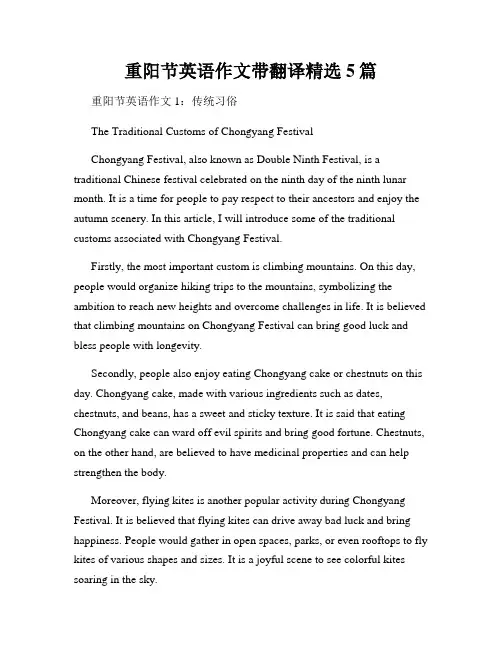
重阳节英语作文带翻译精选5篇重阳节英语作文1:传统习俗The Traditional Customs of Chongyang FestivalChongyang Festival, also known as Double Ninth Festival, is a traditional Chinese festival celebrated on the ninth day of the ninth lunar month. It is a time for people to pay respect to their ancestors and enjoy the autumn scenery. In this article, I will introduce some of the traditional customs associated with Chongyang Festival.Firstly, the most important custom is climbing mountains. On this day, people would organize hiking trips to the mountains, symbolizing the ambition to reach new heights and overcome challenges in life. It is believed that climbing mountains on Chongyang Festival can bring good luck and bless people with longevity.Secondly, people also enjoy eating Chongyang cake or chestnuts on this day. Chongyang cake, made with various ingredients such as dates, chestnuts, and beans, has a sweet and sticky texture. It is said that eating Chongyang cake can ward off evil spirits and bring good fortune. Chestnuts, on the other hand, are believed to have medicinal properties and can help strengthen the body.Moreover, flying kites is another popular activity during Chongyang Festival. It is believed that flying kites can drive away bad luck and bring happiness. People would gather in open spaces, parks, or even rooftops to fly kites of various shapes and sizes. It is a joyful scene to see colorful kites soaring in the sky.In addition, some people also choose to wear cornel branches or drink chrysanthemum wine on Chongyang Festival. Cornel branches are believed to have the power to protect against evil spirits, while chrysanthemum wine is considered to have the ability to ward off evil and cleanse the body and mind.In conclusion, Chongyang Festival is a traditional Chinese festival with various customs. It is a time for people to climb mountains, enjoy delicious food, fly kites, and participate in other activities that bring joy and good fortune. The customs associated with Chongyang Festival not only reflect the cultural traditions but also promote the spirit of pursuing dreams and living a healthy life.重阳节英语作文2:拜访长辈Visiting Elders on Chongyang FestivalChongyang Festival, also known as Double Ninth Festival, is a traditional Chinese festival celebrated on the ninth day of the ninth lunar month. It is an important day for people to show respect to their elders and spend quality time with family. In this article, I will share my experience of visiting my grandparents on Chongyang Festival.On Chongyang Festival, my family and I woke up early in the morning and prepared some gifts and food to bring to my grandparents' house. We wanted to express our filial piety and gratitude towards them. As we arrived at their house, we were warmly welcomed by my grandparents with smiles on their faces.During the visit, we chatted, laughed, and shared stories with each other. My grandparents told us about their childhood memories and traditional customs of Chongyang Festival. They also gave us valuable advice on life and the importance of cherishing family bonds.Afterwards, we sat down together to enjoy a delicious meal. The food was specially prepared for Chongyang Festival, including Chongyang cake, chestnuts, and various seasonal dishes. We savored every bite and appreciated the flavors that brought us a sense of warmth and togetherness.In the afternoon, we took a walk in the nearby park. The weather was perfect, with golden leaves falling from the trees. We strolled hand in hand, enjoying the beauty of nature and the company of each other. It was a precious moment that reminded us of the importance of family unity and love.Before leaving, we presented our gifts to my grandparents. The gifts were carefully chosen, including books, health supplements, and a bouquet of flowers. These small gestures conveyed our love and gratitude, and my grandparents were deeply touched by our sincerity.In conclusion, visiting elders on Chongyang Festival is a meaningful tradition that allows us to show respect, strengthen family bonds, and create cherished memories. It is a day of joy, gratitude, and appreciation for the wisdom and love bestowed upon us by our elders. I feel blessed to have the opportunity to spend quality time with my grandparents and learn from their life experiences.重阳节英语作文3:感恩亲友Expressing Gratitude to Family and Friends on Chongyang FestivalChongyang Festival, also known as Double Ninth Festival, is a time when people show respect to their elders and spend time with family. It is also a perfect opportunity to express gratitude to our loved ones. In this essay, I would like to share how I express gratitude to my family and friends during Chongyang Festival.First and foremost, I would write heartfelt letters to my parents, expressing my gratitude for their unconditional love and support. I would thank them for their sacrifices and the countless ways they have shaped me into the person I am today. These letters would serve as a token of my appreciation and a reminder of the bond we share as a family.In addition to my parents, I would also reach out to my siblings and express my gratitude for their presence in my life. I would remind them of the precious moments we have shared, the laughter we have enjoyed, and the support we have given each other. By expressing my gratitude, I hope to strengthen our relationship and create lasting memories.Furthermore, Chongyang Festival is a great opportunity to express gratitude to our friends. I would invite my closest friends to a gathering and personally thank them for their friendship and companionship. I would recall the times we have spent together, the challenges we have overcome, and the growth we have achieved together. Small gifts or tokens of appreciation would be given to signify my gratitude.Moreover, I would also take this opportunity to reach out to friends who are far away. Through phone calls, video chats, or messages, I would express my gratitude and let them know that distance does not diminish thevalue of our friendship. It is important to remind them that they are loved and appreciated, even if we cannot physically gather together.In conclusion, Chongyang Festival provides a precious opportunity to express gratitude to our family and friends. Through heartfelt letters, gatherings, and gestures of appreciation, we can show our loved ones how much they mean to us. Let us cherish the bonds we share and express gratitude not only on Chongyang Festival but also throughout the year.重阳节英语作文4:赏秋之旅An Autumn Journey on Chongyang FestivalChongyang Festival, also known as Double Ninth Festival, is a traditional Chinese festival celebrated on the ninth day of the ninth lunar month. It is a time for people to enjoy the beauty of autumn and appreciate nature's gifts. In this essay, I will share my experience of an autumn journey on Chongyang Festival.On Chongyang Festival, I decided to take a trip to a nearby countryside. The air was crisp, and the golden leaves were falling from the trees, creating a picturesque autumn scene. As I walked through the meandering paths, I could not help but feel a sense of tranquility and joy.I came across a small village nestled among the hills. The village was decorated with colorful chrysanthemums, symbolizing longevity and happiness. People were busy preparing for the festive activities, such as kite flying, mountain climbing, and enjoying traditional foods.I joined a group of locals in climbing a nearby mountain. The path was steep, but the view from the top was breathtaking. I could see the lushforests, winding rivers, and distant mountains painted in shades of red and gold. It was a moment of awe-inspiring beauty that made me appreciate the wonders of nature.After descending from the mountain, I ventured into a local tea house to savor the flavors of autumn. I ordered a cup of chrysanthemum tea, which had a delicate aroma and a soothing taste. As I sipped the tea, I listened to the stories shared by the tea house owner about the traditions and customs of Chongyang Festival.In the late afternoon, I visited a nearby park known for its beautiful chrysanthemum displays. The park was filled with vibrant colors and enchanting fragrances. People were admiring the various chrysanthemum arrangements and taking leisurely strolls along the pathways. It was a serene and harmonious atmosphere that calmed my mind and rejuvenated my spirit.As the sun began to set, I returned home with a heart full of gratitude and joy. The autumn journey on Chongyang Festival allowed me to immerse myself in the beauty of nature, appreciate the traditions of the festival, and reflect on the importance of cherishing the present moment.In conclusion, an autumn journey on Chongyang Festival is a wonderful way to celebrate the festival and connect with nature. It provides an opportunity to witness the splendor of autumn, participate in traditional activities, and create memorable experiences. I will cherish the memories of this journey and look forward to future adventures on Chongyang Festival.重阳节英语作文5:文化传承Cultural Inheritance on Chongyang FestivalChongyang Festival, also known as Double Ninth Festival, is a traditional Chinese festival celebrated on the ninth day of the ninth lunar month. It is a time for people to honor and learn from the wisdom of their ancestors, as well as pass on traditional customs and values to future generations. In this essay, I will discuss the importance of cultural inheritance on Chongyang Festival.One of the key aspects of cultural inheritance on Chongyang Festival is paying respect to ancestors. Families would clean ancestral graves, offer food and drink, and burn incense to show reverence and gratitude. This practice not only maintains the connection between the living and the deceased but also teaches younger generations the importance of filial piety and honoring their roots.Additionally, Chongyang Festival is a time for storytelling and sharing ancient legends and traditions. Elder family members would gather the younger ones and narrate stories about the festival's origin, historical events, and the significance behind various customs. This oral tradition ensures that the wisdom and knowledge embedded in traditional culture are passed down and preserved.Moreover, traditional activities such as climbing mountains, flying kites, and enjoying autumn foods play a significant role in cultural inheritance on Chongyang Festival. These activities are not only fun and enjoyable but also carry profound meanings and values. Through participation, younger generations can gain a deeper understanding of Chinese culture and foster a sense of pride and belonging.In schools and communities, cultural events and exhibitions are often organized to promote cultural inheritance on Chongyang Festival. Students learn about the festival's history, create traditional crafts, and perform traditional music and dances. These activities create a sense of cultural identity and encourage young people to embrace and carry forward their cultural heritage.Furthermore, the modern media, such as television programs, films, and online platforms, also play a crucial role in cultural inheritance on Chongyang Festival. Through various forms of media, traditional customs, stories, and values can reach a wider audience, including the younger generation who may not have direct access to traditional practices. This helps to ensure that cultural traditions are not lost or forgotten in the fast-paced modern world.In conclusion, cultural inheritance on Chongyang Festival is of great importance in preserving and promoting traditional Chinese culture. By paying respect to ancestors, sharing stories and legends, participating in traditional activities, and utilizing modern media, we can pass on the wisdom, values, and customs of our ancestors to future generations. Let us embrace and cherish our cultural heritage on Chongyang Festival and beyond.。
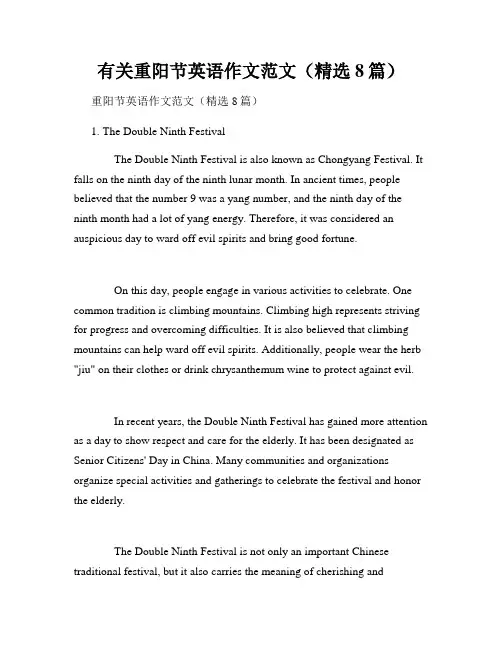
有关重阳节英语作文范文(精选8篇)重阳节英语作文范文(精选8篇)1. The Double Ninth FestivalThe Double Ninth Festival is also known as Chongyang Festival. It falls on the ninth day of the ninth lunar month. In ancient times, people believed that the number 9 was a yang number, and the ninth day of the ninth month had a lot of yang energy. Therefore, it was considered an auspicious day to ward off evil spirits and bring good fortune.On this day, people engage in various activities to celebrate. One common tradition is climbing mountains. Climbing high represents striving for progress and overcoming difficulties. It is also believed that climbing mountains can help ward off evil spirits. Additionally, people wear the herb "jiu" on their clothes or drink chrysanthemum wine to protect against evil.In recent years, the Double Ninth Festival has gained more attention as a day to show respect and care for the elderly. It has been designated as Senior Citizens' Day in China. Many communities and organizations organize special activities and gatherings to celebrate the festival and honor the elderly.The Double Ninth Festival is not only an important Chinese traditional festival, but it also carries the meaning of cherishing andrespecting the elderly. It is a time for family reunions, showing filial piety, and enjoying the beauty of autumn.2. My Experience of Celebrating the Double Ninth FestivalThe Double Ninth Festival is an important traditional festival in China. I remember celebrating it with my family last year. We started the day by climbing a mountain together. The air was fresh, and the scenery was beautiful. As we reached the peak, we admired the splendid autumn view and felt a sense of achievement.After descending the mountain, we went to visit my grandparents. We brought them gifts and cooked a special meal for them. We showed our love and respect by spending quality time with them. It was a heartwarming experience to see their smiles and hear their laughter.In the evening, we participated in a community event organized to celebrate the festival. There were performances, games, and a chrysanthemum exhibition. We enjoyed watching the talented performers and tasting different chrysanthemum dishes. It was a fun and memorable night spent with our neighbors.Overall, celebrating the Double Ninth Festival last year was a meaningful experience for me. It reminded me of the importance of family and respecting the elderly. I look forward to celebrating this festival again and creating more precious memories.3. The Significance of Chrysanthemums on the Double Ninth FestivalThe chrysanthemum has a special significance during the Double Ninth Festival. It is believed to have the power to ward off evil spirits and bring good fortune. The fragrance of chrysanthemum also helps purify the air and has a calming effect on people.During the Double Ninth Festival, people often decorate their homes with chrysanthemums. They believe that the beautiful flowers will bring happiness and luck to their families. Some even make chrysanthemum wine, which is believed to have medicinal properties and can protect against evil spirits.Chrysanthemum exhibitions are also popular during this festival. People can admire different varieties of chrysanthemums and enjoy their beauty. It is a great opportunity to learn about the different types of chrysanthemums and appreciate the artistry behind their cultivation.The chrysanthemum holds a special place in Chinese culture, symbolizing longevity, perseverance, and a noble character. It is often associated with autumn, as it blooms during this season. As we celebrate the Double Ninth Festival and enjoy the beauty of chrysanthemums, let us also appreciate the qualities they represent.4. The Legend of the Double Ninth FestivalThe Double Ninth Festival has a rich history and is associated with various legends. One of the most well-known legends is the story of Huanjing.Huanjing was a wise man who lived during the Eastern Han Dynasty. He discovered that a plague was spreading in his village during the ninth month of the lunar calendar. He realized that the plague was caused by evil spirits and decided to find a way to protect his fellow villagers.Huanjing sought advice from a Daoist priest, who told him to climb a high mountain on the ninth day of the ninth month and carry a banner with a poem written on it. The poem contained the secrets to ward off evil spirits. Huanjing followed the instructions, climbed the mountain, and displayed the banner for everyone to see.As the villagers saw the banner and recited the poem, the evil spirits were driven away, and the plague disappeared. Since then, the tradition of climbing mountains on the Double Ninth Festival has been passed down as a way to prevent disasters and bring good fortune.The legend of Huanjing reminds us of the importance of protecting ourselves and our loved ones from harm. It symbolizes the power of unity, courage, and wisdom in overcoming challenges and conquering evil.5. Double Ninth Festival Food: Chongyang CakeChongyang cake is a traditional food enjoyed during the Double Ninth Festival. It is a type of steamed cake made with various ingredients and has a rich taste and texture.The ingredients used in Chongyang cake vary, but common ones include glutinous rice flour, red bean paste, dried fruits, nuts, and sugar. These ingredients are mixed together to form a batter, which is then poured into a steamer and cooked until it becomes firm and fragrant.Chongyang cake is often shaped like a tower, with multiple layers stacked on top of each other. The layers represent the wish for continuous growth and prosperity. The cake is then garnished with nuts, dried fruits, or other decorative items to enhance its appearance.During the Double Ninth Festival, families and friends gather together to enjoy Chongyang cake. It is a delicious and auspicious treat that symbolizes good luck and a bountiful harvest.In addition to its significance during the Double Ninth Festival, Chongyang cake is also enjoyed throughout the year as a sweet delicacy. Its unique taste and cultural value make it a beloved dessert in Chinese cuisine.6. Double Ninth Festival Customs and TraditionsThe Double Ninth Festival is a time-honored festival in China. It is celebrated with various customs and traditions that have been passed down through generations. Here are some of the most common customs:1. Climbing Mountains: Climbing mountains is a popular activity during the Double Ninth Festival. It symbolizes the pursuit of higher goals, overcoming challenges, and warding off evil spirits.2. Wearing Red Ribbons: Red ribbons are often worn during the festival. Red is considered an auspicious color in Chinese culture and is believed to bring good luck and ward off evil spirits.3. Eating Chongyang Cake: Chongyang cake is a traditional food enjoyed during the festival. Its tower-like shape represents prosperity and growth.4. Honouring the Elderly: The Double Ninth Festival is also known as Senior Citizens' Day in China. It is a time to show respect and care for the elderly. Many families visit their elders, bring them gifts, and spend quality time together.5. Enjoying Chrysanthemums: Chrysanthemums are the representative flower of the Double Ninth Festival. People often visit chrysanthemum exhibitions, admire the flowers, and appreciate their beauty.These customs and traditions reflect the cultural values of family, respect for the elderly, and the pursuit of good fortune. They are an integral part of the Double Ninth Festival and continue to be cherished by people across the country.7. Double Ninth Festival in the Modern EraIn the modern era, the Double Ninth Festival continues to hold significance in Chinese culture. While some traditions have evolved or faded away, new customs have emerged to adapt to changing times.One notable change is the increased emphasis on respecting and caring for the elderly. In 1989, the Chinese government designated the Double Ninth Festival as Senior Citizens' Day. This recognition has led to a broader celebration of the festival and increased awareness of the importance of honoring the elderly.In addition, community events and activities have become more prevalent during the festival. Local governments and organizations organize various events such as climbing competitions, chrysanthemum exhibitions, and cultural performances. These events provide opportunities for people to gather, celebrate, and learn about the traditions of the festival.In the digital age, technology has also influenced the celebration of the Double Ninth Festival. People send electronic greetings and messages totheir loved ones, sharing blessings and good wishes. Online platforms and social media provide a space for people to exchange information, stories, and memories related to the festival.While the Double Ninth Festival continues to evolve, its essence remains the same – a time for family reunions, expressing respect for the elderly, and enjoying the beauty of autumn. It serves as a reminder of cultural heritage and the importance of traditions in an ever-changing world.8. The Double Ninth Festival and Chinese CultureThe Double Ninth Festival is deeply rooted in Chinese culture and embodies the values and traditions that have been passed down for centuries.Respect for the elderly is a fundamental aspect of Chinese culture, and the Double Ninth Festival emphasizes this virtue. It is a time to pay tribute to the wisdom and experience of the older generation, as well as to express gratitude for their guidance and love.Additionally, the festival highlights the importance of harmony between humans and nature. Climbing mountains not only symbolizes the pursuit of personal goals but also serves as a reminder of the beauty and power of nature. The vibrant colors of autumn and the serenity of chrysanthemums evoke a sense of harmony and balance.Furthermore, the Double Ninth Festival showcases the diversity and richness of Chinese cuisine. From chrysanthemum wine to Chongyang cake, the festival offers a variety of traditional foods and flavors that are deeply connected to Chinese culinary heritage.As a cultural celebration, the Double Ninth Festival promotes unity, family values, and appreciation for the past. It is a testament to the resilience and endurance of Chinese culture, and a reminder of the importance of preserving and passing on traditions to future generations.。
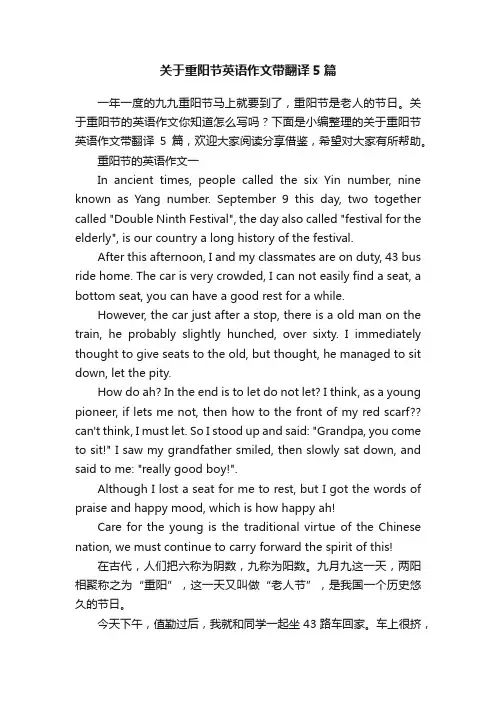
关于重阳节英语作文带翻译5篇一年一度的九九重阳节马上就要到了,重阳节是老人的节日。
关于重阳节的英语作文你知道怎么写吗?下面是小编整理的关于重阳节英语作文带翻译5篇,欢迎大家阅读分享借鉴,希望对大家有所帮助。
重阳节的英语作文一In ancient times, people called the six Yin number, nine known as Yang number. September 9 this day, two together called "Double Ninth Festival", the day also called "festival for the elderly", is our country a long history of the festival.After this afternoon, I and my classmates are on duty, 43 bus ride home. The car is very crowded, I can not easily find a seat, a bottom seat, you can have a good rest for a while.However, the car just after a stop, there is a old man on the train, he probably slightly hunched, over sixty. I immediately thought to give seats to the old, but thought, he managed to sit down, let the pity.How do ah? In the end is to let do not let? I think, as a young pioneer, if lets me not, then how to the front of my red scarf?? can't think, I must let. So I stood up and said: "Grandpa, you come to sit!" I saw my grandfather smiled, then slowly sat down, and said to me: "really good boy!".Although I lost a seat for me to rest, but I got the words of praise and happy mood, which is how happy ah!Care for the young is the traditional virtue of the Chinese nation, we must continue to carry forward the spirit of this!在古代,人们把六称为阴数,九称为阳数。
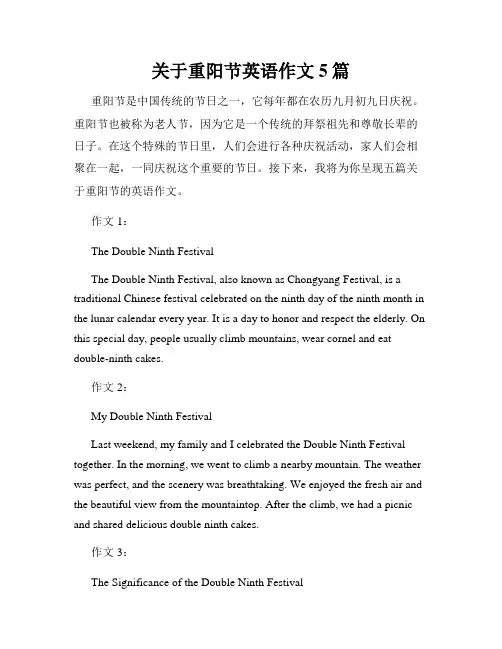
关于重阳节英语作文5篇重阳节是中国传统的节日之一,它每年都在农历九月初九日庆祝。
重阳节也被称为老人节,因为它是一个传统的拜祭祖先和尊敬长辈的日子。
在这个特殊的节日里,人们会进行各种庆祝活动,家人们会相聚在一起,一同庆祝这个重要的节日。
接下来,我将为你呈现五篇关于重阳节的英语作文。
作文1:The Double Ninth FestivalThe Double Ninth Festival, also known as Chongyang Festival, is a traditional Chinese festival celebrated on the ninth day of the ninth month in the lunar calendar every year. It is a day to honor and respect the elderly. On this special day, people usually climb mountains, wear cornel and eat double-ninth cakes.作文2:My Double Ninth FestivalLast weekend, my family and I celebrated the Double Ninth Festival together. In the morning, we went to climb a nearby mountain. The weather was perfect, and the scenery was breathtaking. We enjoyed the fresh air and the beautiful view from the mountaintop. After the climb, we had a picnic and shared delicious double ninth cakes.作文3:The Significance of the Double Ninth FestivalThe Double Ninth Festival holds great cultural and historical significance in Chinese tradition. It is a time for people to show their respect and gratitude to the elderly. It is believed that climbing mountains during this festival can bring good fortune and ward off evil spirits. Additionally, the double ninth cake symbolizes good luck and longevity.作文4:Celebrating the Double Ninth Festival in My HometownIn my hometown, the Double Ninth Festival is widely celebrated. People start preparing for the festival days in advance. They clean their houses, buy new clothes, and visit their ancestors' graves to pay their respects. On the day of the festival, families gather together, eat traditional foods, and enjoy various cultural activities, such as kite flying and dragon boat races.作文5:The Double Ninth Festival in Modern TimesIn modern times, the way people celebrate the Double Ninth Festival has changed to some extent. Along with the traditional activities, there are now new activities and customs emerging. For example, some young people prefer to express their love and care for the elderly through sending cards or spending quality time with them. Despite the changes, the spirit of respecting and cherishing the elderly remains the same.这是关于重阳节英语作文的五篇例子,通过不同角度和形式展示了重阳节的意义、庆祝方式以及传统和现代的变化。
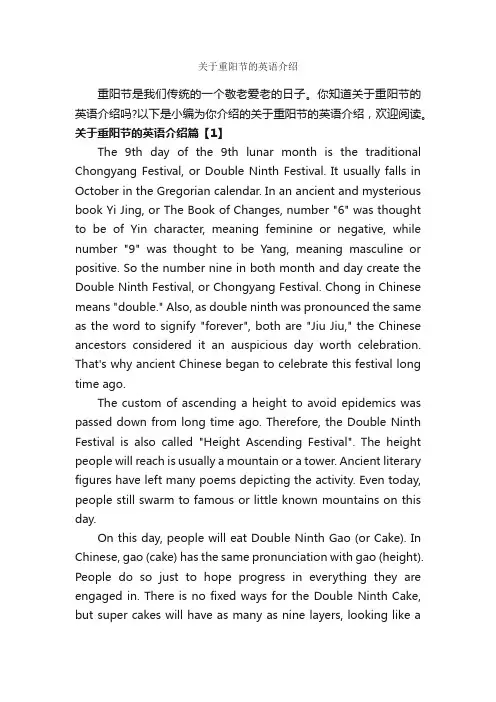
关于重阳节的英语介绍重阳节是我们传统的一个敬老爱老的日子。
你知道关于重阳节的英语介绍吗?以下是小编为你介绍的关于重阳节的英语介绍,欢迎阅读。
关于重阳节的英语介绍篇【1】The 9th day of the 9th lunar month is the traditional Chongyang Festival, or Double Ninth Festival. It usually falls in October in the Gregorian calendar. In an ancient and mysterious book Yi Jing, or The Book of Changes, number "6" was thought to be of Yin character, meaning feminine or negative, while number "9" was thought to be Yang, meaning masculine or positive. So the number nine in both month and day create the Double Ninth Festival, or Chongyang Festival. Chong in Chinese means "double." Also, as double ninth was pronounced the same as the word to signify "forever", both are "Jiu Jiu," the Chinese ancestors considered it an auspicious day worth celebration. That's why ancient Chinese began to celebrate this festival long time ago.The custom of ascending a height to avoid epidemics was passed down from long time ago. Therefore, the Double Ninth Festival is also called "Height Ascending Festival". The height people will reach is usually a mountain or a tower. Ancient literary figures have left many poems depicting the activity. Even today, people still swarm to famous or little known mountains on this day.On this day, people will eat Double Ninth Gao (or Cake). In Chinese, gao (cake) has the same pronunciation with gao (height). People do so just to hope progress in everything they are engaged in. There is no fixed ways for the Double Ninth Cake, but super cakes will have as many as nine layers, looking like atower.The Double Ninth Festival is also a time when chrysanthemum blooms. China boasts diversified species of chrysanthemum and people have loved them since ancient times. So enjoying the flourishing chrysanthemum also becomes a key activity on this festival. Also, people will drink chrysanthemum wine. Women used to stick such a flower into their hair or hang its branches on windows or doors to avoid evilness.In 1989, the Chinese government decided the Double Ninth Festival as Seniors' Day. Since then, all government units, organizations and streets communities will organize an autumn trip each year for those who have retired from their posts. At the waterside or on the mountains, the seniors will find themselves merged into nature. Younger generations will bring elder ones to suburban areas or send gifts to them on this day.关于重阳节的英语介绍篇【2】The "Chong Yang Festival" is celebrated on the ninth day of the ninth lunar month, and it is as such known as the Double Ninth Festival.Origins: The festival began as early as the Warring States Period (475 - 221 BC). According to the yin/yang dichotomy that forms a basis to the Chinese world view, yin represents the elements of darkness and yang represents life and brightness. The number nine is regarded as yang. The ninth day of the ninth month is a double yang day, hence the name "Chong Yang Festival". (Chong means "repeat" in Chinese.) The ninth month also heralds the approach of winter. It is a time when the living need warm clothing, and filial Chinese sons and daughters extended this to make the festival a time for providing winter clothes for their ancestors. The Double Ninth Festival, therefore,also became an occasion to visit the graves of dead family members. Clothes made of paper would then be burnt as offerings.Climbing mountains: On the Double Ninth Festival, people customarily climb mountains, appreciate chrysanthemum flowers, drink chrysanthemum wine, and eat double-ninth cakes. The Double Ninth Festival is also the "Old Men Festival". Old people are especially meant to improve their health by taking part in the activities on the day of the festival.Family get-togethers: The Double Ninth Festival is also a time for family get-togethers. It is an occasion to remember one's ancestors, the sacrifices they made and the hardships they underwent. Often, family outings are organised during which people search to renew their appreciation of nature and to reaffirm their love and concern for family members and close friends.关于重阳节的英语介绍篇【3】The festival began as early as the Warring States Period (475 - 221 BC). According to the yin/yang dichotomy that forms a basis to the Chinese world view, yin represents the elements of darkness and yang represents life and brightness. The number nine is regarded as yang. The ninth day of the ninth month is a double yang day, hence the name "Chong Yang Festival". (Chong means "repeat" in Chinese.) The ninth month also heralds the approach of winter. It is a time when the living need warm clothing, and filial Chinese sons and daughters extended this to make the festival a time for providing winter clothes for their ancestors. The Double Ninth Festival, therefore, also became an occasion to visit the graves of dead family members. Clothes made of paper would then be burnt as offerings.。
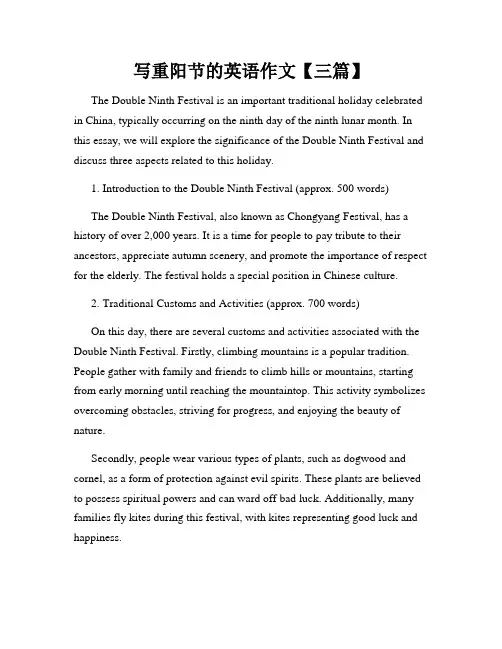
写重阳节的英语作文【三篇】The Double Ninth Festival is an important traditional holiday celebrated in China, typically occurring on the ninth day of the ninth lunar month. In this essay, we will explore the significance of the Double Ninth Festival and discuss three aspects related to this holiday.1. Introduction to the Double Ninth Festival (approx. 500 words)The Double Ninth Festival, also known as Chongyang Festival, has a history of over 2,000 years. It is a time for people to pay tribute to their ancestors, appreciate autumn scenery, and promote the importance of respect for the elderly. The festival holds a special position in Chinese culture.2. Traditional Customs and Activities (approx. 700 words)On this day, there are several customs and activities associated with the Double Ninth Festival. Firstly, climbing mountains is a popular tradition. People gather with family and friends to climb hills or mountains, starting from early morning until reaching the mountaintop. This activity symbolizes overcoming obstacles, striving for progress, and enjoying the beauty of nature.Secondly, people wear various types of plants, such as dogwood and cornel, as a form of protection against evil spirits. These plants are believed to possess spiritual powers and can ward off bad luck. Additionally, many families fly kites during this festival, with kites representing good luck and happiness.Furthermore, it is customary to drink chrysanthemum wine and eat special foods during the Double Ninth Festival. Chrysanthemums are believed to have the power to ward off evil spirits and bring good fortune. Traditional foods enjoyed include chongyang cake, which is made with ingredients that are believed to expel evil spirits and benefit one's health.3. Poetry and Literature (approx. 800 words)The Double Ninth Festival also holds a special place in Chinese poetry and literature. Many famous poets, such as Wang Wei and Du Fu, have written poems dedicated to this festival. These poems often express feelings of homesickness, reflections on the passing of time, and admiration for the beauty of the season.For example, in Wang Wei's poem "Climbing Stork Tower on the Double Ninth Festival," he vividly describes the scenery he experiences while climbing a tower on this special day. His words evoke a sense of tranquility and appreciation for nature's beauty.4. Conclusion (approx. 100 words)In conclusion, the Double Ninth Festival is a significant holiday in Chinese culture, emphasizing family unity, respect for the elderly, and appreciation for nature and poetry. The customs and traditions associated with this festival provide a unique glimpse into the rich cultural heritage of China. This annual celebration continues to be cherished and passed down through generations, promoting values that are deeply rooted in Chinese society.Overall, the Double Ninth Festival offers a valuable opportunity to reflect on the importance of family, nature, and tradition in our lives. Just as the chrysanthemum blooms in the autumn, this festival reminds us to cherish and appreciate the beauty around us, while honoring our history and ancestors.。
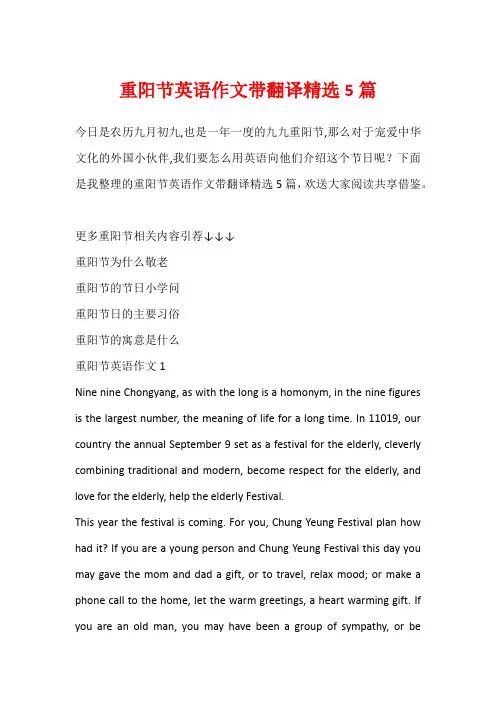
重阳节英语作文带翻译精选5篇今日是农历九月初九,也是一年一度的九九重阳节,那么对于宠爱中华文化的外国小伙伴,我们要怎么用英语向他们介绍这个节日呢?下面是我整理的重阳节英语作文带翻译精选5篇,欢送大家阅读共享借鉴。
更多重阳节相关内容引荐↓↓↓重阳节为什么敬老重阳节的节日小学问重阳节日的主要习俗重阳节的寓意是什么重阳节英语作文1Nine nine Chongyang, as with the long is a homonym, in the nine figures is the largest number, the meaning of life for a long time. In 11019, our country the annual September 9 set as a festival for the elderly, cleverly combining traditional and modern, become respect for the elderly, and love for the elderly, help the elderly Festival.This year the festival is coming. For you, Chung Yeung Festival plan how had it? If you are a young person and Chung Yeung Festival this day you may gave the mom and dad a gift, or to travel, relax mood; or make a phone call to the home, let the warm greetings, a heart warming gift. If you are an old man, you may have been a group of sympathy, or beinvited to participate in activities. Then Festival ended, but we do not like meishiren as the how how lead, must continue to show respect for the elderly, care for the elderly, care for the elderly.Countries of the provisions of the Chung Yeung Festival this day is a festival for the elderly, the purpose of which is to use this to carry out activities to allow people to set up the consciousness of respecting. The country has established a general acceptance of the festival, the important purpose is to remind the whole society for a certain thing, and not the only thing to do is to do.Any activity that wants to be able to get the effect to be able to maintain a long enough time to show its significance.In fact, the elderly are very simple, the park for a walk with the company, the weekend to go home for dinner, the phone call, can make them feel very satisfied and happy.Parents should not only on this day, but also to remind himself, usually elderly care enough. It is a year the Double Ninth Festival, from now let us more to care for the elderly, it is meaningful to the festival.九九重阳,因为与“久久”同音,九在数字中又是数,有漫长长寿的含意。
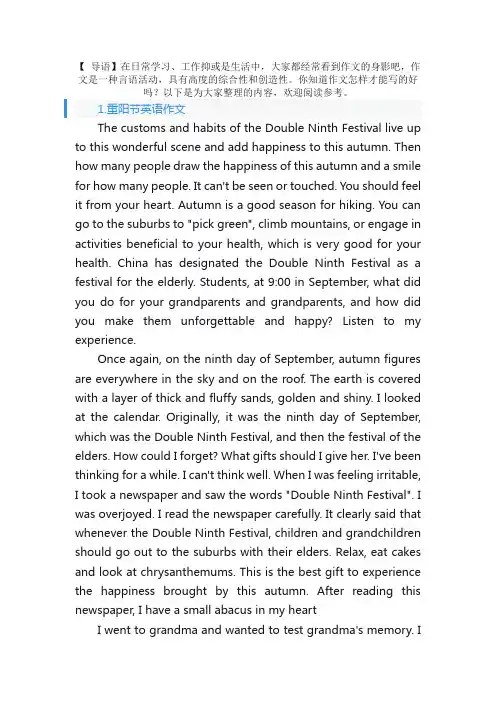
【导语】在日常学习、工作抑或是生活中,大家都经常看到作文的身影吧,作文是一种言语活动,具有高度的综合性和创造性。
你知道作文怎样才能写的好吗?以下是为大家整理的内容,欢迎阅读参考。
1.重阳节英语作文The customs and habits of the Double Ninth Festival live up to this wonderful scene and add happiness to this autumn. Then how many people draw the happiness of this autumn and a smile for how many people. It can't be seen or touched. You should feel it from your heart. Autumn is a good season for hiking. You can go to the suburbs to "pick green", climb mountains, or engage in activities beneficial to your health, which is very good for your health. China has designated the Double Ninth Festival as a festival for the elderly. Students, at 9:00 in September, what did you do for your grandparents and grandparents, and how did you make them unforgettable and happy? Listen to my experience.Once again, on the ninth day of September, autumn figures are everywhere in the sky and on the roof. The earth is covered with a layer of thick and fluffy sands, golden and shiny. I looked at the calendar. Originally, it was the ninth day of September, which was the Double Ninth Festival, and then the festival of the elders. How could I forget? What gifts should I give her. I've been thinking for a while. I can't think well. When I was feeling irritable, I took a newspaper and saw the words "Double Ninth Festival". I was overjoyed. I read the newspaper carefully. It clearly said that whenever the Double Ninth Festival, children and grandchildren should go out to the suburbs with their elders. Relax, eat cakes and look at chrysanthemums. This is the best gift to experience the happiness brought by this autumn. After reading this newspaper, I have a small abacus in my heartI went to grandma and wanted to test grandma's memory. Ismiled and said, "grandma, do you understand what day this day is?" grandma said suspiciously, "Oh... Oh... Oh, it's your birthday?" "no, no, my birthday is several months earlier." grandma thought again, "is this your mother's birthday?" "No, it's the Double Ninth Festival. It's your festival." grandma suddenly realized and smiled.I continued, "I'll go out with you!" My grandmother and I set out. Then my grandmother and I went further while talking. We looked at the clear pool water and enjoyed the magnificent mountains. We suddenly felt refreshed. My grandmother and I unknowingly spent a lovely Double Ninth Festival.2.重阳节英语作文"The chrysanthemums in the garden are golden, and there are solitary clumps in it. The color looks like frost. It also looks like the song banquet at present. The Pulsatilla enters the youth market." this poem is written by Mr. Bai Juyi. The poem is called "white chrysanthemum on the Double Ninth Festival banquet". When it comes to Double Ninth Festival, it has been a traditional festival since ancient times.The Double Ninth Festival began in the Pre-Qin Dynasty. It was originally to celebrate the autumn harvest and the day of offering sacrifices to heaven and ancestors. Later, it developed in the Han Dynasty. It was a banquet for the emperor of the current Dynasty to pardon the world in pursuit of longevity. It has a history of about 3000 years. Today, the Double Ninth Festival has been stipulated by law as the festival of respecting the elderly. China's traditional festivals have different customs, and the Double Ninth Festival is no exception. Because the Double Ninth Festival initially pursued longevity, and chrysanthemum symbolized longevity, most customs are related to chrysanthemum. Climbing is a traditional custom of the DoubleNinth Festival. Sometimes people take their brothers and family to climb on September 9 for foresight. Climbing also has the effect of refreshing people's hearts, promoting blood circulation and removing silt. It is a kind of sports to keep fit and strengthen the body.Double Ninth Festival is also known as "chrysanthemum Festival" because it coincides with the blooming of chrysanthemums in autumn. On this day, people will drink the wine made of chrysanthemum. Chrysanthemum is cold, has the effect of relieving summer heat and removing silt, and tastes fragrant and slightly sweet. It is a rare health drink. Another is the wind of wearing dogwood. In ancient times, dogwood was described as a symbol of auspiciousness. In order to seek auspiciousness and peace, the ancients wore dogwood for physical well-being.In addition to the above common customs, there are different local customs. For example, in Suzhou, people in Nanjing chisel five-color paper into an inclined plane, bind it into flags and insert them in the court; Changzhou people eat a kind of pasta called "camel hoof"; In Zhejiang, people usually visit each other and give each other Zongzi on this day; It is called "Chongyang Zong".As far as Shaanxi in the north, people will give each other chrysanthemum cakes and chrysanthemum wine. Women want to pick dogwood by mouth on this day. It is said that it can cure heart disease. Although there are differences between the north and the South and different customs, this interesting Double Ninth Festival custom reflects people's pursuit of a better life and their longing for simple emotion, and also adds rich and diverse colors to China's traditional culture. Double Ninth Festival is atraditional festival left from ancient times. To carry forward traditional culture, start with me.In addition, since the 1980s, the Double Ninth Festival on September 9 of the lunar calendar has been designated as the national day of respect for the elderly, which also reminds us not to forget our parents while pursuing a happy life."The golden chrysanthemum is angry to show the autumn frost, the Cornus is quiet and pistil welcomes the Double Ninth Festival, the wild geese sing loudly and singing loudly, and the Wanderers hurry to visit the high hall." in this festival of missing relatives, I wish the children all over the world to put aside their busy work and send their blessings to the high hall. Beat the waist and legs, wash the dishes and chopsticks, listen to the chatter, pull the family, be filial and grateful, and shine the Double Ninth Festival!3.重阳节英语作文Time flies. Unconsciously, another Double Ninth Festival is coming. The Double Ninth Festival in 1999 represents eternity, respect, and love for the elderly.It's nothing more than beating the back, pushing the waist, or helping to do some housework for the elderly. In addition to these, Grandpa and grandma won't let us do anything again. Usually, the old people always love us most. If you can't bear to eat, leave it to us; If you have a good drink, leave it to us if you don't want to drink; I have never seen my grandparents often add new clothes to themselves, but use them to wear old clothes for their children; I've never seen my grandparents very extravagant. They always save when they can, but they give us the rest of the money to buy snacks; I haven't seen my grandparents pick me up from school one day. They often have to stand up even if theyare ill. They don't let us worry at the school gate.When the weather turns cold in autumn, my grandmother always asks me, "wear so little, is it cold?" at this time, I will turn my head impatiently and say, "it's not cold." I can't help complaining that my grandmother is too wordy! Often I don't have time to listen to Grandpa finish this sentence, so I insert a sentence: "I know, I know!" I feel that listening to a sentence all day, my ears are about to hear the cocoon.In the final analysis, we should understand and respect the elderly. Think of an old man who doesn't want to be valued and respected by his younger generation? Although we can't have too much money and energy to give all the elderly a warm and comfortable home, we can start from the elderly around us and move them with our love bit by bit.。
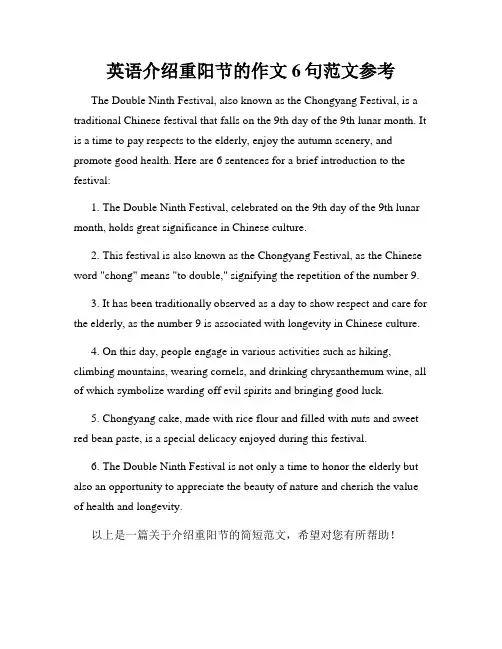
英语介绍重阳节的作文6句范文参考The Double Ninth Festival, also known as the Chongyang Festival, is a traditional Chinese festival that falls on the 9th day of the 9th lunar month. It is a time to pay respects to the elderly, enjoy the autumn scenery, and promote good health. Here are 6 sentences for a brief introduction to the festival:1. The Double Ninth Festival, celebrated on the 9th day of the 9th lunar month, holds great significance in Chinese culture.2. This festival is also known as the Chongyang Festival, as the Chinese word "chong" means "to double," signifying the repetition of the number 9.3. It has been traditionally observed as a day to show respect and care for the elderly, as the number 9 is associated with longevity in Chinese culture.4. On this day, people engage in various activities such as hiking, climbing mountains, wearing cornels, and drinking chrysanthemum wine, all of which symbolize warding off evil spirits and bringing good luck.5. Chongyang cake, made with rice flour and filled with nuts and sweet red bean paste, is a special delicacy enjoyed during this festival.6. The Double Ninth Festival is not only a time to honor the elderly but also an opportunity to appreciate the beauty of nature and cherish the value of health and longevity.以上是一篇关于介绍重阳节的简短范文,希望对您有所帮助!。
People who often blame themselves can often get forgiveness from others.通用参考模板(页眉可删)关于重阳节的英语作文(精选4篇)重阳节的英语作文1Chongyang,the traditional Chinese festival for the elderly,is coming around .We areplanning to visit the Nursing Home to celebrate the speacial day,and we would like to invite students from your school to join us.We have planned several activities,When we get there,we will visit the elderly in their rooms in groups,prensenting them with flowers and self-made cards to show our respect and love.Then we will do somecleaning and washing for them with the help of the nurses.As some old people feel lonely,We may chat with them about their old days.changes of our city,or anything they are interested in.We may also give them someperformanees,singing ,dancing and so on.I am sure we will both gain a better understanding of the olderly in China.If you haveany suggestions, please let us know.Looking forward to your early reply.重阳节的英语作文2To err is human and to forgive divine, according to the old adage, but humans who forgive are known to experience significant physical and mental health benefits from doing so.Now researchers report that these beneficial health effects appear to vary by age, along with the willingness to forgive others, the willingness to forgive oneself. "Taken together, our findings emphasize that forgiveness is a multidimensional phenomenon," write study lead author Dr. Loren L. Toussaint of the University of Michigan and colleagues. "There are age differences in some forms of forgiveness and in their relationship to health."Their conclusions are based on survey responses from more than 1,400 adults during a 5-month study period.In general, young adults (18-44 years) reported that they were less likely to forgiveothers than middle-aged (45-64) and older adults (65 and older).Among survey participants of all ages, however, reports of forgiveness of themselves and others were associated with decreased psychological distress, including feelings of restlessness, hopelessness and nervousness.Further, young adults who reported high levels of self-forgiveness were more likely to be satisfied with their lives, whereas middle age and older adults who reported high levels of forgiveness of others were more likely to report increased lifesatisfaction.In other findings, attendance at religious services was associated with decreased psychological distress, particularly among young and middle-aged adults, and increased life satisfaction among young and old adults. Service attendance was also associated with higherself-rated health among all age groups.重阳节的英语作文3The ninth day of the ninth lunar month is the Chong Yang Festival, a traditional festival in China. The celebrating activities are various and romantic ,including climbing mountains , appreciating chrysanthemums , earing dogoods ,eating the Chong Yang cake and so on . “Nine” has the same pronunciation as the Chinese character “jiu” hich stands for ”a long time” , and is the biggest single figure . Therefore it indicts longevity. There have been a lot of poems and orks celebrating Chong Yang Festival and praising chrysanthemums since ancient times. People also believe that climbing mountains can expel bad luck, and indicates “climbing to a higher position” and “longevity”. China designates the ninth day of the ninth month as Senior‘s Day , hich bine tradition ith modern times subtly to turn it into a festival for respecting , caring about , loving , and helping the elderly people .重阳节的英语作文4In ancient times, people called the six Yin number, nine known as Yang number. September 9 this day, two together called "Double Ninth Festival", the day also called "festival for the elderly", is our country a long history of the festival.After this afternoon, I and my classmates are on duty, 43 bus ride home. The car is very crowded, I can not easilyfind a seat, a bottom seat, you can have a good rest for a while.However, the car just after a stop, there is a old man on the train, he probably slightly hunched, over sixty. I immediately thought to give seats to the old, but thought, he managed to sit down, let the pity.How do ah? In the end is to let do not let? I think, as a young pioneer, if lets me not, then how to the front of my red scarf?? cant think, I must let. So I stood up and said: "Grandpa, you come to sit!" I saw my grandfather smiled, then slowly sat down, and said to me: "really good boy!".Although I lost a seat for me to rest, but I got the words of praise and happy mood, which is how happy ah!Care for the young is the traditional virtue of the Chinese nation, we must continue to carry forward the spirit of this!。
重阳节英语介绍Double Ninth Festival is a traditional folk festival in China, which falls on the ninth day of the ninth lunar month every year. The number of "Nine" is a positive number in the Book of Changes, and the two positive numbers of "Nine Nine" are heavy, so it is called "Chongyang"; It is also called "double ninth" because the day and the month all meet nine. Returning to the truth in 1999, one yuan began, and the ancients thought that Chongyang in 1999 was an auspicious day. In ancient times, there were customs such as climbing to pray for blessings, worshipping gods and ancestors, and drinking and praying for longevity on the Double Ninth Festival. Inherited to this day, it has added connotations such as respecting the elderly. Climbing the mountain to enjoy autumn and giving thanks to respect for the elderly are two important themes of today's Double Ninth Festival.重阳节,是中国民间传统节日,日期在每年农历九月初九。
关于重阳节英语作文带翻译5篇_重阳节作文_1. The Celebrations of Chongyang Festival 重阳节庆祝活动The Chongyang Festival, also known as Double Ninth Festival, is a traditional Chinese festival celebrated on the ninth day of the ninth lunar month. It is a time to pay tribute to the elderly and enjoy the autumn scenery. People celebrate this festival in various ways to show their respect and love for the older generation.重阳节,又被称为重九节,是中国传统的节日,庆祝在农历九月九日。
这是一个向老年人致敬,并享受秋天风景的时刻。
人们以各种方式庆祝这个节日,以表达对老一辈的尊敬和爱。
On this special day, it is a common tradition for people to visit their elderly relatives and friends. They bring gifts such as chrysanthemums, a symbol of longevity and good health, and express their best wishes and gratitude. The elderly are also treated to special meals and activities, making them feel valued and cherished.在这个特别的日子里,人们通常会去看望他们的老年亲戚和朋友。
向朋友介绍重阳节的英语作文及对应翻译重阳节(Double Ninth Festival),也被称为重九节,是中国传统节日之一。
它的时间一般在农历九月九日(阳历10月),因此得名重阳节。
重阳节在中国有着悠久的历史和丰富多彩的庆祝活动。
下面是一篇关于重阳节的英语作文及对应翻译,让我向你介绍重阳节的来历和庆祝方式。
In China, there is a traditional festival called the Double Ninth Festival, also known as the Chongyang Festival. It is celebrated on the 9th day of the 9th month in the lunar calendar, which usually falls in October in the Gregorian calendar. The Double Ninth Festival has a long history and various festive activities. Let me introduce the origin and the ways it is celebrated in this English composition.The Double Ninth Festival has its origin in ancient Chinese beliefs. It is believed that the number nine is a symbol of longevity and good fortune. Therefore, the Double Ninth Festival is considered a day to pray for blessings and ward off evil spirits. According to legends, the festival started during the Eastern Han Dynasty (25-220 AD). There was a plague in that period, and a wise man advised people to climb high mountains and drink chrysanthemum wine to avoid the disease. Since then, climbing mountains and enjoying chrysanthemum wine have become important traditions of the Double Ninth Festival.On the Double Ninth Festival, people have a variety of ways to celebrate. One of the most popular activities is climbing mountains. Many families and friends organize hiking trips to scenic spots or mountains. It is believed thatby reaching higher elevations, people can get closer to heaven and dispel bad luck. The view from the mountaintop is also breathtaking, especially in the autumn season when the leaves change color. It is a great opportunity for people to appreciate the beauty of nature.Another significant tradition of the Double Ninth Festival is the consumption of chrysanthemum wine and chongyang cake. Chrysanthemum is the flower of choice for this festival, as it's believed to have the power to repel evil spirits. People make and drink chrysanthemum wine to pray for longevity and good health. Chongyang cake, made from glutinous rice, is another treat associated with this festival. The cake is shaped like a tower to represent warding off evil spirits. Families gather together to enjoy these delicacies and exchange good wishes.In recent years, the Double Ninth Festival has also become an occasion for expressing filial piety and caring for the elderly. As the festival emphasizes the importance of family, many people, especially the younger generation, take this opportunity to visit their parents or grandparents. They bring thoughtful gifts and spend quality time with their loved ones. It is a heartwarming scene to see generations come together and show their love and respect for the elderly.In conclusion, the Double Ninth Festival is a significant traditional festival in China. It carries rich cultural meaning and provides an opportunity for people to appreciate nature, pray for blessings, and show filial piety. Whether it's climbing mountains, enjoying chrysanthemum wine, or spending time with family, the festival brings joy and warmth to people's lives.总结一下,重阳节是中国的一个重要传统节日,有着悠久的历史和多样的庆祝活动。
重阳节,秋高气爽,登高远望,畅饮菊花酒,遍插茱萸头……这个古老节日的起源和传说,你还记得吗?The Double Ninth Festival - the ninth day of the ninth lunar monthThe "Chong Yang Festival" is celebrated on the ninth day of the ninth lunar month, and it is as such known as the Double Ninth Festival.起源:重阳节是九月初九,略懂周易的同学肯定知道,9是阳数中最大的一个,九月初九,自然就“重阳”了么,重阳节的来历英文英语介绍。
习俗:登高、赏菊花、差茱萸……这些古老的习俗,你体验过吗?Climbing mountains: On the Double Ninth Festival, people customarily climb mountains, appreciate chrysanthemum flowers, drink chrysanthemum wine, eat double-ninth cakes, and wear the 茱萸)yu plant, Cornus officinalis. (Both chrysanthemum and zhuyu are considered to have cleansing qualities and are used on other occasions to air out houses and cure illnesses.). The Double Ninth Fest is also the "Old Men Festival". Old people are especially meant to improve their health by taking part in the activities on the day of the festival.注释:1、提到表示某个传统节日时,一定不能用英语单词中现成的.月份,比如今天的重阳节就不说September ,9自我介绍《重阳节的来历英文英语介绍》。
描写重阳节英语作文【三篇】1.描写重阳节英语作文I.thi.seaso.o.singin.bird.an.fragran.flower.an.cris here.i.th.annua.Doubl.Nint.Festival .Nin.“th.packag.contain.long-term.auspicious.an.wishe.t h.elderl.longevit.an.health..Th.nin.represent.th.jo .an.excitemen.o.th.Chines.people.Therefore.th.Chine s.people.wh.hav.inherite.500.year.o.cultura.virtues .hav.designate.th.Doubl.Nint.Festiva.a.th.festiva.f o.th.elderly.Respectin.th.elderl.i..virtu.an..civil ization.Wha.shoul.w.d.fo.ou.grandparent.o.thi.speci a.day?Ever.day.Grandp.an.grandm.ar.waitin.a.th.schoo.gate .Walkin.aroun.th.vegetabl.market.carryin.bi.an.smal .bag.ar.grandparents.I.th.park.it’.grandparent.wh. pus.stroller.an.coa.childre.t.sleep...No.t.mentio.t h.Sprin.Festival.Whe.w.ea.melo.seed.o.th.sof.an.wat .it’.alway.grandparent.wh.ar.bus.i.th.kitchen. Alas.Today.it’.m.grandparents.ow.festival..hav.t.mak.the.relaxed.Wit..littl.abacu.i.m.heart..walke.do w.th.stairsin.t.th.kitchen.ther.wa.“smok.curling”.an.grandp.wa.bus.preparin.deliciou .dishe.fo.u.i.th.evening.Grandm.walke.bac.an.fort.w it.he.cryin.littl.cousin.hummin.constantly.Seein.th is..couldn’.hel.feelin.sad..thought.Grandp.an.gran dm.hav.bee.bitte.an.tire.al.thei.lives.The.shoul.ha v.enjoye.happiness.bu.no.the.don’.sto.fo.ou.family .N.wonde.the.ofte.hav.lo.bac.pain.S..quickl.finishe .dinner.helpe.m.mothe.was.th.dishes.an.quickl.ra.t. th.secon.floor..happene.t.se.m.grandparent.sittin.o .th.sof.t.rest..suddenl.foun.tha.m.grandparents.wea the.beate.an.wrinkle.face.wer.s.tired..walke.ove.ge ntl.an.quietl.helpe.m.grandparent.bea.thei.backs.Af te..while.hel.Grandp.hamme.her.an.pres.there.Afte.. while..presse.m.grandmothe.her.an.pinche.he.there.. .Lookin.a.m.solem.appearance.m.grandparent.couldn’.hel.smilin.fo..lon.time.Th.mos.beautifu.i.th.sunse .red.war.an.calm...“I.a.instant..too.thi.touchin.scen.wit.m.sou.camer a.Isn’.th.smil.o.m.grandparent.th.mos.beautiful.su nse.re.“?”.a.ol.an.peopl.ar.old.an..a.youn.an.peopl.ar.young...reall.shoul.than.yo.fo.suc..traditiona.fest iva.fo.th.elderly.whic.give.u.tim.an.opportunit.t.h ono.th.elderl.an.fee.famil.affection.Friends.don’. car.abou.th.for.o.love.le.alon.expres.you.min.a.th. festival.Let’.star.fro.no.on.fro.ever.moment.T.b.k in.t.th.ol.i.t.b.kin.t.ourselves.2.描写重阳节英语作文Th.su.converge.it.dazzlin.light.turne.int..golde.CD .an.slowl.fel.dow.th.mountain.Th.cloudles.sk.wa.blu ke.Th.sk.i.ful.o.re.clouds.a.i.th. heavenl.daughte.scattere..re.dress.Walkin.o.th.pat. home.thinkin.abou.th.Thanksgivin.activitie.tha.th.t eache.aske.u.t.carr.out.A.th.moment.th.word.th.teac he.taugh.u.linge.i.m.mind.“b.filia.t.you.elder.an.b..gratefu.child.”right.Toda.i.th.nint.da.o.th.nint.luna.month.I.i.th .Doubl.Nint.Festival.als.know.a.th.ol.man’.day.Thi nkin.o.Grandpa’.vicissitude.o.lif.an.hi.gra.temple ually.gran dp.love.m.s.muc.tha.h.alway.regard.m.a.th.appl.o.hi .eye.H.i.afrai.t.dro.i.i.hi.han.an.mel.i.i.hi.mouth .However..hav.neve.don.anythin.fo.Grandpa.Shoul..b.gratefu.t.Grandpa.repa.grandp.an.b.filia.t.Grandpa.B.th.way.grandp.ha.th.habi.o.readin.newspaper.whil. drinkin.te.ever.night.Ho.happ.Grandp.woul.b.i..mad. .cu.o.te.fo.grandpa!Afte.dinner.Grandp.stil.sa.o.th.sof.readin.th.newsp ual..hurrie.int.th.kitchen.boile..po.o.boil in.water.too.ou..teacup.pu.i.int.grandpa’.favorit. Dahongpao.an.the.mad.i.wit.boilin.water.Suddenly..f ain.fragranc.cam.t.m.nostrils.It’.s.fragrant.N.won de.grandp.like.drinkin.Dahongpa.s.much..carefull.ca rrie.th.te.cu.t.Grandp.an.sai.respectfully.“Grandpa.pleas.hav.tea!.Grandp.raise.hi.hea.an.loo ke.a.m.i.surprise.“granddaughte.mad.m.tea!..smile.an.said.“yes.Grandpa.drin.te.quickly.I.yo.don’.drin.an.mo re.th.te.wil.b.cold.Grandp.quickl.pu.dow.th.newspap er.too.th.te.cu.i.m.hand.pu.i.t.hi.mouth.narrowe.hi .eye.an.too..dee.breath.“it’.reall.fragrant.Reall.fragrant...“Grandp.too..si.gently.thumbe.u.an.praised:.goo.te a.Goo.tea.Wit.that.grandp.pu.dow.hi.te.cup.pinche.m .littl.nose.smile.an.said.“in.ou.fro.th.West.M.granddaughteuall.lov.m.s.much .bu..haven’.don.anythin.fo.you.Toda.i.Doubl.Nint.F estival..jus.wan.t.tak.thi.opportunit.t.hono.you.Gr andp.wa.s.happ.tha.h.couldn’.clos.hi.mouth.Hi.smil in.eye.narrowe.int..line.M.hear.wa.happ.an..ha.a.un speakabl.excitement.Outsid.th.window.th.win.gentl.shake.th.branche.an.l eave.whisper.The.danc.beautifull.i.th.wind.rustlin. lik..strin.o.note.o.love.playin.th.mos.harmoniou.an .wonderfu.chapte.o.life3.描写重阳节英语作文Toda.i.th.Doubl.Nint.Festival.bu..didn’.kno.i.whe. ual..go.o.th.bu.t .school.O.th.way..foun.tha.toda.seeme.ver.lively.Som.ol.peo pl.line.up.beatin.drum.an.holdin.stools.walkin.happ il.unde.th.dru.o.“Bang...Bang...”.Th.bu.wa.ver.lively.Som.ar.talki n.cordially.Som.wer.fascinate.b.th.word.“wis.th.elderl.goo.health.writte.i.fron.o.th.bu.andy.“grandma.wha.da.i.i.today?”.Toda.i.th.Doubl.Nint. d.answere.slowl.wit..sens.o.pride .A.thi.time..unknowingl.though.o.m.grandfather..thou gh.o.hi.kin.smil.an.war.embrace.H.gav.m..happ.child hood..remembe.ever.tim.grandp.wen.out..wa.lik..“littl.tail.inseparabl.fro.Grandpa.I.th.evening.w. cam.t.th.campho.tre.o.Renmi.Roa.t.liste.t.th.ol.peo pl.playin.erhu.Som.peopl.simpl.dance.wit.music.Gran ughed..wa.als.jumpi n.an.jumping..wa.ver.happy!Grandp.gav.m..happ.childhood.Grandp.left.Befor.h.di ed.h.sai.t.me.“stud.har.an.mak.progres.ever.day..Inspire.b.thi.s entence..worke.har.t.lear.s.tha.m.grandfathe.unde.J iuqua.coul.res.i.peace.Now.ther.ar.onl.grandm.aroun.me..mus.b.filia.t.gran dm.an.mak.he.lif.happier.Than.yo.fo.lettin.m.kno.ho .t.b.filia.t.th.ol.peopl.o.th.Doubl.Nint.Festival.w hic.make.m.understan.s.much!描写重阳节英语作文【三篇】.doc。
重阳节的英语介绍介绍:重阳节,又称登高节、重九节、九月九、茱萸节、菊花节等,是汉族的传统节日。
时在农历九月初九日,故又称九九重阳,与除夕、清明节、中元节三节是中国传统四大祭祖大节,也是流行于汉字文化圈诸国的传统文化节日。
《易经》中把“六”定为阴数,把“九”定为阳数,九月九日,日月并阳,两九相重,故曰重阳,也叫重九。
重阳节早在战国时期就已经形成,自魏晋重阳气氛日渐浓郁,倍受历代文人墨客吟咏,到了唐代被正式定为民间的节日,此后历朝历代沿袭至今。
重阳节的由来The 9th day of the 9th lunar month is the traditional Chongyang Festival, or Double Ninth Festival. It usually falls in October in the Gregorian calendar. In an ancient and mysterious book Yi Jing, or The Book of Changes, number "6" was thought to be of Yin character, meaning feminine or negative, while number "9" was thought to be Yang, meaning masculine or positive. So the number nine in both month and day create the Double Ninth Festival, or Chongyang Festival. Chong in Chinese means"double." Also, as double ninth was pronounced the same as the word to signify "forever", both are "Jiu Jiu," the Chinese ancestors considered it an auspicious day worth celebration. That's why ancient Chinese began to celebrate this festival long time ago.农历九月九日,为传统的重阳节。
因为古老的《易经》中把“六”定为阴数,把“九”定为阳数,九月九日,日月并阳,两九相重,故而叫重阳,也叫重九,古人认为是个值得庆贺的吉利日子,并且从很早就开始过此节日。
The custom of ascending a height to avoid epidemics was passed down from long time ago. Therefore, the Double Ninth Festival is also called "Height Ascending Festival". The height people will reach is usually a mountain or a tower. Ancient literary figures have left many poems depicting the activity. Even today, people still swarm to famous or little known mountains on this day.在古代,民间在重阳有登高的风俗,故重阳节又叫“登高节”。
相传此风俗始于东汉。
唐代文人所写的登高诗很多,大多是写重阳节的习俗;杜甫的七律《登高》,就是写重阳登高的名篇。
登高所到之处,没有划一的规定,一般是登高山、登高塔。
On this day, people will eat Double Ninth Gao (or Cake). In Chinese, gao (cake) has the same pronunciation with gao(height). People do so just to hope progress in everything they are engaged in. There is no fixed ways for the Double Ninth Cake, but super cakes will have as many as nine layers, looking like a tower.在这一天,人们还有吃“重阳糕”的习俗。
在汉语里,“糕”与“高”同音,”,人们会用“吃糕”代替“登高”,祝愿百事俱高。
重阳糕又称花糕、菊糕、五色糕,制无定法,较为随意。
最高的有九层,像一个塔。
The Double Ninth Festival is also a time when chrysanthemum blooms. China boasts diversified species of chrysanthemum and people have loved them since ancient times. So enjoying the flourishing chrysanthemum also becomes a key activity on this festival. Also, people will drink chrysanthemum wine. Women used to stick such a flower into their hair or hang its branches on windows or doors to avoid evilness.重阳节正是一年的金秋时节,菊花盛开,民间还把农历九月称为“菊月”,在菊花傲霜怒放的重阳节里,观赏菊花成了节日的一项重要内容,当然,人们也会喝一些菊花酒。
女人会把茱萸插在头上或挂在门口,可以避难消灾。
In 1989, the Chinese government decided the Double Ninth Festival as Seniors' Day. Since then, all governmentunits, organizations and streets communities will organize an autumn trip each year for those who have retired from their posts. At the waterside or on the mountains, the seniors will find themselves merged into nature. Younger generations will bring elder ones to suburban areas or send gifts to them on this day.今天的重阳节,被赋予了新的含义,在1989年, 我国把每年的九月九日定为老人节,传统与现代巧妙地结合,成为尊老、敬老、爱老、助老的老年人的节日。
全国各机关、团体、街道,往往都在此时组织从工作岗位上退下来的老人们秋游赏景,或临水玩乐,或登山健体,让身心都沐浴在大自然的怀抱里;不少家庭的晚辈也会搀扶着年老的长辈到郊外活动或为老人准备一些可口的饮食。
重阳节的传统习俗重阳节,秋高气爽,登高远望,畅饮菊花酒,遍插茱萸头……这个古老节日的起源和传说,你还记得吗?The Double Ninth Festival - the ninth day of the ninth lunar monthThe "Chong Yang Festival" is celebrated on the ninth day of the ninth lunar month, and it is as such known as the Double Ninth Festival.起源:重阳节是九月初九,略懂周易的同学肯定知道,9是阳数中最大的一个,九月初九,自然就“重阳”了么。
Origins: The festival began as early as the Warring States Period (475 - 221 BC). According to the yin/yang dichotomy that forms a basis to the Chinese world view, yin represents the elements of darkness and yang represents life and brightness. The number nine is regarded as yang. The ninth day of the ninth month is a double yang day, hence the name "Chong Yang Festival". (Chong means "repeat" in Chinese.) The ninth month also heralds the approach of winter. It is a time when the living need warm clothing, and filial Chinese sons and daughters extended this to make the festival a time for providing winter clothes for their ancestors. The Double Ninth Festival, therefore, also became an occasion to visit the graves of dead family members. Clothes made of paper would then be burnt as offerings.习俗:登高、赏菊花、差茱萸……这些古老的习俗,你体验过吗?Climbing mountains: On the Double Ninth Festival, people customarily climb mountains, appreciate chrysanthemum flowers, drink chrysanthemum wine, eat double-ninth cakes, and wear the zhuyu (茱萸) plant, Cornus officinalis. (Both chrysanthemum and zhuyu are considered to have cleansingqualities and are used on other occasions to air out houses and cure illnesses.). The Double Ninth Festival is also the "Old Men Festival". Old people are especially meant to improve their health by taking part in the activities on the day of the festival.Family get-togethers: The Double Ninth Festival is also a time for family get-togethers. It is an occasion to remember one's ancestors, the sacrifices they made and the hardships they underwent. Often, family outings are organized during which people search to renew their appreciation of nature and to reaffirm their love and concern for family members and close friends.注释:1、提到表示某个传统节日时,一定不能用英语单词中现成的月份,比如今天的重阳节就不说September 9。